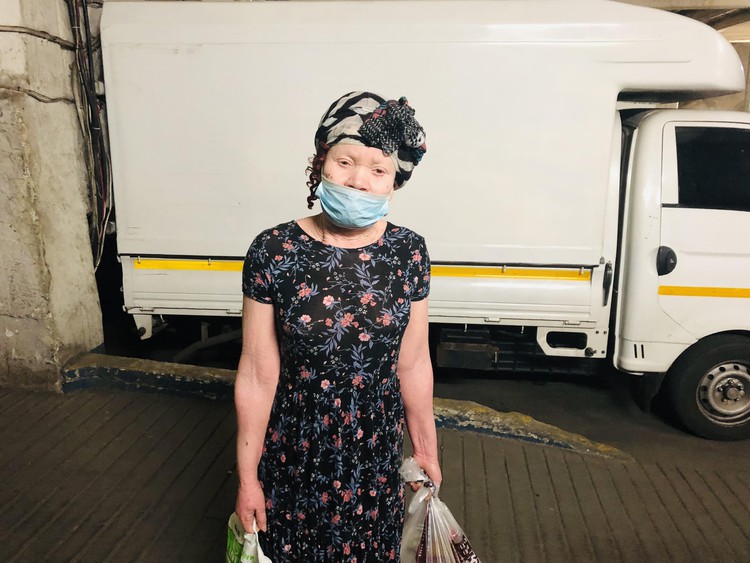
26 October 2021
Dambudzo Mutove and her daughter are battling to survive on handouts on the street. Photos: Kimberly Mutandiro
For Dambudzo Mutove from Zimbabwe, cooking warm meals for herself and her 13-year-old daughter is a luxury she can no longer afford. She has survived begging on street corners for the past nine years since coming to South Africa, but of late, handouts have become fewer.
“A nice and warm home-cooked meal is all we wish for,” says Mutove.
Save the Children SA and several other organisations have rung alarm bells over the crisis facing immigrant families, like Mutove’s, who do not qualify for government assistance because they have no documents.
In May 2020, at the onset of the hard Covid lockdown, a group of organisations wrote to the Department of Social Development appealing for the inclusion of all immigrant families in the government’s Covid relief packages. The National Interagency Working Group, chaired by Save the Children SA, included Lawyers for Human Rights, the Consortium for Refugees and Migrants in South Africa, and Terre des Hommes, among others.
“We write to you regarding the extended vulnerability that the Covid-19 pandemic and national lockdown has had on vulnerable children and their families,” said the letter. “It is imperative that an effective response includes all children and therefore their families. We commend the Department of Social Development in its extended and progressive effort to provide relief through food parcels, top-up grants, Social Relief of Distress Grant and special Covid-19 Social Relief Distress Grant. We are however concerned about the limitations in the eligibility criteria required to access these grants.”
The organisations said applications were possible only for those with SA identity documents and some refugees and permit holders.
“These forms of documentation are limiting and not inclusive of children and their parents who may be undocumented South African citizens, asylum seekers, undocumented, stateless, unaccompanied and separated children … We believe that in order for the Covid-19 response to be effective it must include all people living in South Africa.”
They also requested food parcels and feeding schemes be made available to all vulnerable children in South Africa, including immigrant children and their families.
More than a year later, the group says it has never received a response from the Department.
GroundUp asked the DSD to confirm receipt of the letter and what happened to the response. The spokesperson replied that the government is only able to provide social relief of distress to immigrants with refugee, asylum seeker or special permits and to permanent residents. The spokesperson did not reply to questions about whether or not the Save the Children letter had been received.
According to the DSD, as at 13 October 2021, 15,039 asylum seekers, 37,796 special permit holders from Lesotho, 15,559 from Zimbabwe and 4,082 from Angola had applied, as well as 5,299 refugees.
“Deprivation of food among migrant families has long term or life changing implications on the children,” says Nyika Machenjedze of Save the Children SA. “Covid-19 has impacted on the ability of these families to earn sufficient income. A decrease in nutrition results in poor growth in children which deprives them of their right to development and survival.”
Grace beyond Borders, an organisation that helps immigrants with food relief, says the numbers of immigrants asking for food have increased and the means to feed them are limited.
“Since the pandemic started we have received numerous cries from members of the migrant community about not being able to access government funding,” said Aurélie Kalenga, co-founder and co-director.
“We’ve had women coming to our handouts after leaving loved ones at the mortuary who succumbed to Covid-19. We have children who come with their parents gravely ill and in hospital. Most of the people will have not had real food in a long time.”
Lissette Ngombo’s business collapsed in the Covid lockdown.
Lissette Ngombo a doctor from the Democratic Republic of Congo, struggled to find work and started a second hand clothing business. But the business crashed with the pandemic and she and her husband have been struggling to feed and send their young children to school.
“With how bad things are, my husband and l fast and give all the food to our children. I’ve failed to secure a job as a doctor with an asylum permit. Not having food affects our children most. I have waited for years but in vain to get refugee status and can even be arrested for practising with just an asylum permit. Now that our business has ended I need a job more than ever,” Ngombo said.
Also from DRC, Konde Fifi lost her job as a domestic worker. She too is struggling to feed her children.
“Our children were born here but we struggle to secure food relief and other services from the government using asylum permits. All we want is to be able to feed and raise them freely,” Fifi said.
Konde Fifi lost her domestic worker job.